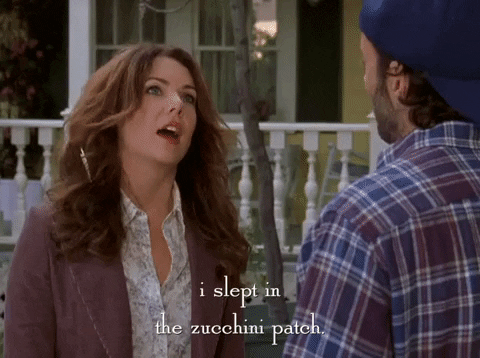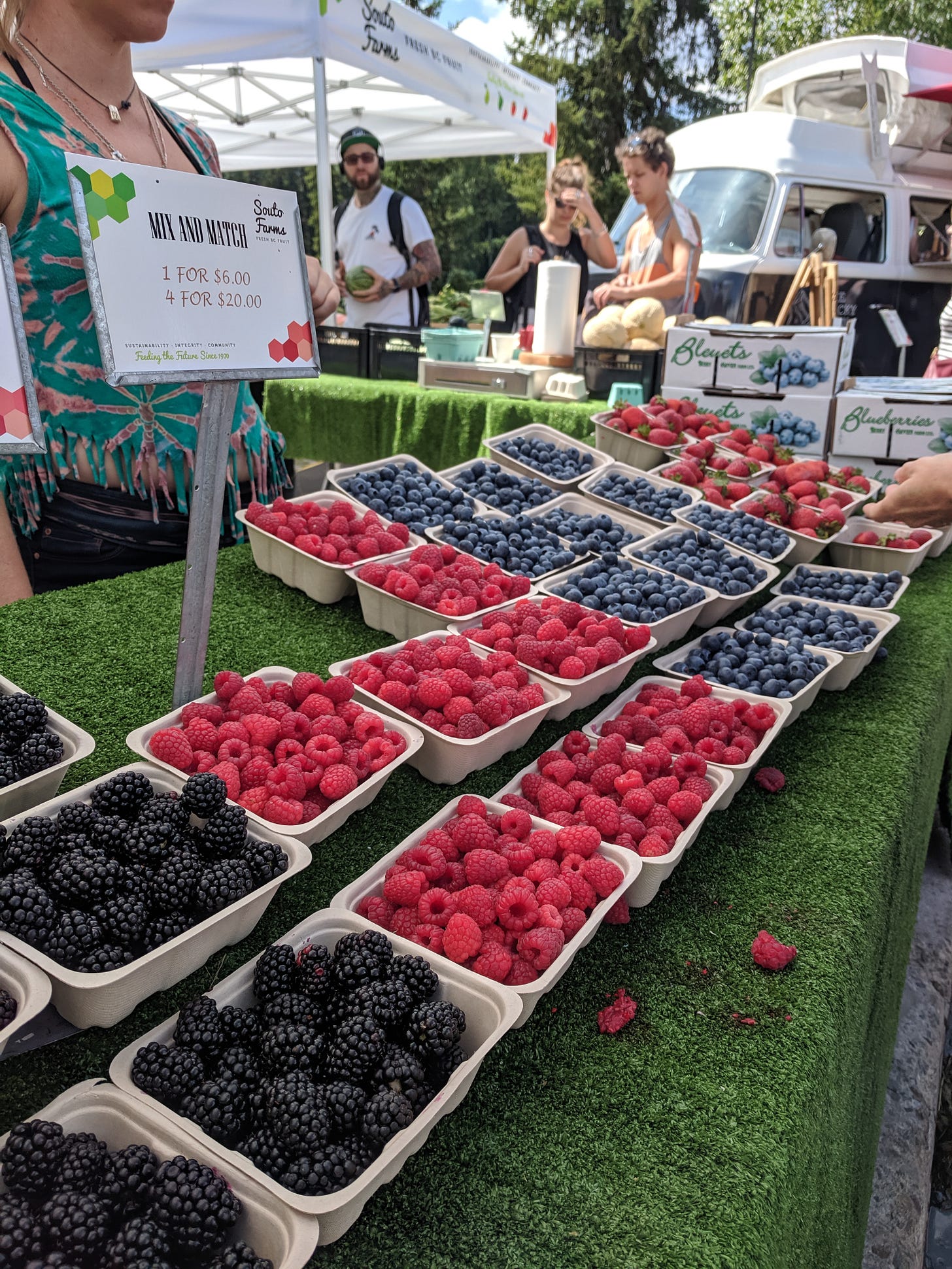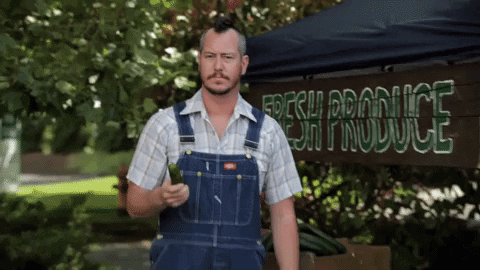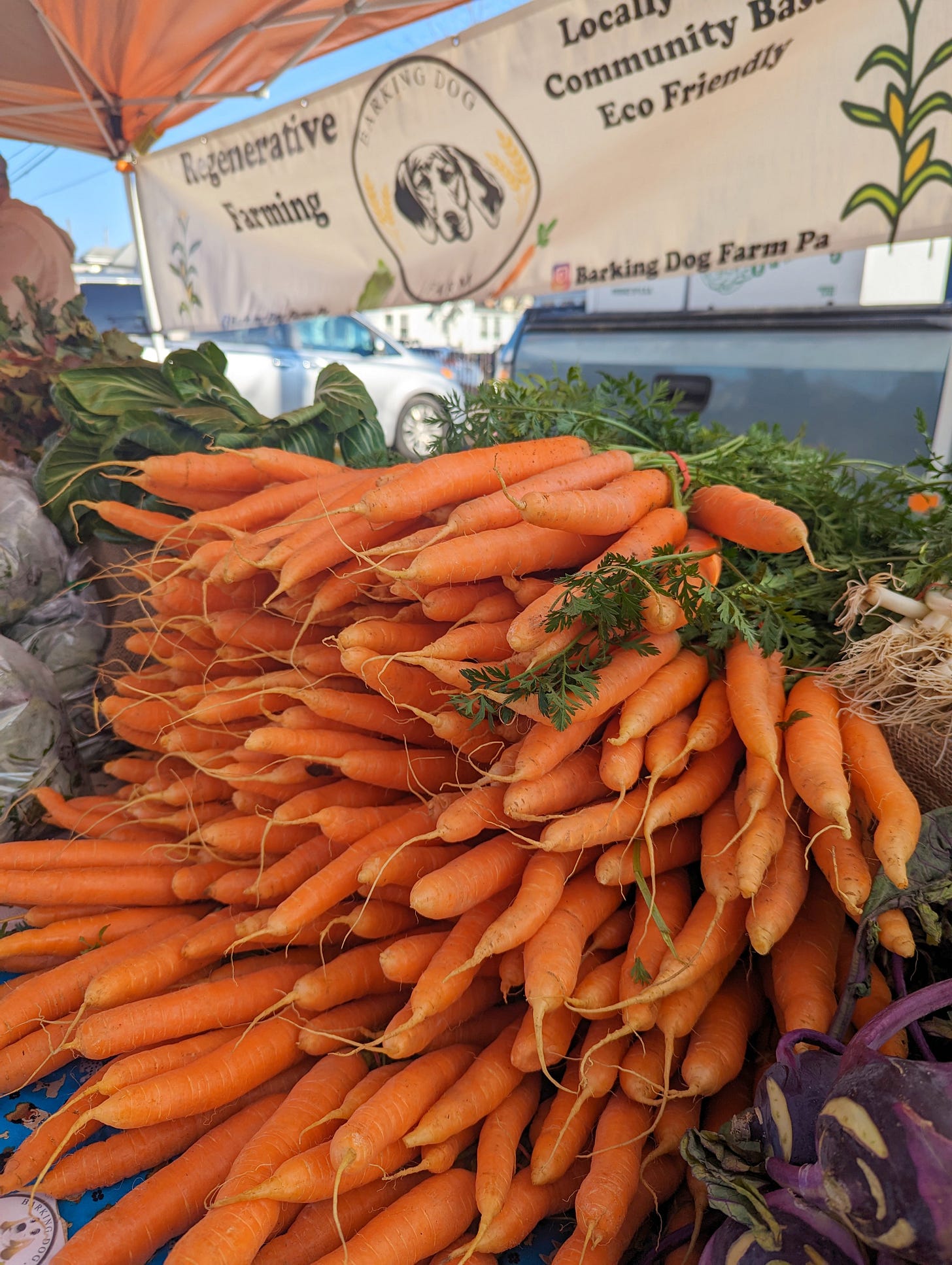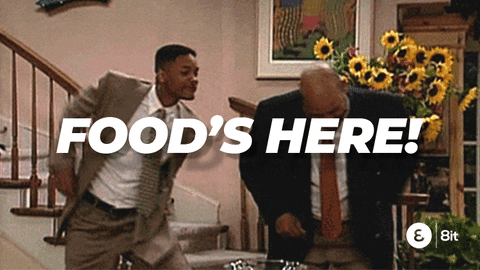issue #6: meet you at the market
bring your wallet (or at least your phone to post cute pics on Instagram)
Preparing for the summer zucchini party and doting on farmers’ markets (because that’s so millennial of me, and that’s my lot in life). Scaling back on plastic pants, which were never a good idea in the first place.
And losing my mind over the mental gymnastics and hypocrisy we’re witnessing in politics to control women, children, and critical thinking. Real life called to ask how near to dead a pregnant woman has to be before a doctor is legally allowed to help her. Like.. is it close? Or super close? Or super super close? 🤯
No worries dudes, you’re good. There’s always a doc in town ready to help with even the slightest of head colds. Unless the Comstock Act gets resurrected. Then your Viagra might be on lockdown.
Today is…
National Zucchini Bread Day
Every gardener knows when one zucchini pops up, they will be coming in hot. Right now, those zucchini are probably seeds or maybe little seedlings. But when they’re ready, we need to be armed with loads of recipes (or a list of friends without their own zucchini explosions) to ensure they don’t go to waste.
Here are some ways I’ve used up zucchini when it bursts out of my garden. If you have a recipe or two to share, I’d love for you to share it in the comments. I’ll share them in July when the zucchini are popping. Alternatively, you could donate them to your local food pantry.
sustainable spotlight
Farmers’ markets are more than just farmers. If you remember Tricia from loveBB who I featured last week, she’s a pro at selling sustainable products at local outdoor markets in her community. She’s done more than 70 outdoor markets in the last year and a half, and she’s had such success that she even coaches others to follow suit.
Her hottest products at the markets are lip balm (she just launched a Disney lip balm line which is cool) made with local beeswax and her homemade spiced cocoa. I can imagine that’s pretty perfect on some of those chillier market days!
They also make great gifts for Mother’s Day, which will be here before we know it. She’s offering 25% off your first purchase with code JEN25 which you can use online if you’re not in her local area. It’s worth a peek!
growing with the growers
Go figure that on the day I’m about to wax poetic to you about farmers’ markets, I get an email from my local farmers’ market noting that they’re moving to a bigger parking lot because they are growing with their growers. It’s a great day to spend my pennies on delicious food grown in my region!
Before I dive into why farmers’ markets matter, let’s be clear that I regularly shop at our local grocery store. Unfortunately, I’ve been there four times this week already (which is an epic grocery list preparation fail on my part, but alas, sh*t happens). I do not love grocery shopping one bit.
We are beyond fortunate to live in the opposite of a food desert (I think I have 8 or 9 grocery stores within a few miles of my house) including all the cult-following classics. Trader’s Joe. Check. Whole Foods. Check. Wegmans. Check. Sprouts. Check. Not to mention Walmart, Target, and the local version of Albertsons and Krogers. The gang’s all here, friends.
I’m not sure how they all stay in business. I suspect union busting, prioritization of Big Agriculture and Big Food, and consolidation have something to do with it for most of them. The FTC seems to agree. But big grocery stores feed most of us, and they aren’t all bad.
People like Jon Steinman think we can do better. In his book, Grocery Story: The Promise of Food Co-ops in the Age of Grocery Giants**, Steinman discusses how big grocery stores have contributed to our very broken food system. He argues that investment in local food co-ops spurs the creation of local food-based economies and enhances low-income food access.
His argument is yet another version of the same story we’ve seen time and again where the fallout of anti-trust laws becoming anti-cool hurt our society. We have fifty years of history to show us that the Reaganomics story of “giving all the money to the rich people so they can grow businesses that create good jobs and most efficiently and effectively generate and distribute wealth” isn’t working. The wealth isn’t trickling down, Chad.
It never did. It just ushered in massive increases in income inequality and gave us mega-billionaires cat-fighting over whose billions will take them to space first. That’s worked out well. So what does that have to do with farmers’ markets?
Farmers’ markets let us buy food grown in our neighborhoods and regions. That’s good for farmers, the local economy, the community, our bodies, and the climate.
local money stays local + builds resiliency
When we shop directly, farmers get a substantially larger portion of the profit from their labor. According to the American Independent Business Alliance, local companies return nearly three times as much value to the local economy as their national chain counterparts. That’s a lot more money flowing into the community instead of being sent to large corporate offices and shareholders outside the area.
Spending locally also increases the velocity of money, the speed at which money moves through the economy, and benefits each person or organization whose bank account through which it flows. Those farmers pay local workers, vendors, and others, keeping money moving through their local business partners. In short, more people benefit from that spending in a shorter time.
Local businesses also invest way more in local community initiatives. That couldn’t be more clear than on the backs of our local baseball league jerseys, which are littered with all the amazing local businesses willing to put $250 toward a great community league for the kids. Zero big multi-national conglomerate names are donning their little shirts. (Maybe the $250 is hard to come by for them… right? 🙄) It's anecdotal evidence, but I bet it holds in your neck of the woods too.
Lastly, as described by Kate Raworth in her book Doughnut Economics: Seven Ways to Think Like a 21st-Century Economist**, relying on a few monstrous companies instead of a network of goods and service providers introduces instability to our economy. Supporting farmers’ markets and the smaller growers and producers who sell at those markets adds a layer of diversity and resiliency to the local food supply. That’s a good thing (actually, a great thing).
local food is good for our bodies
When we shop at farmers’ markets, we get food picked when it’s ripe (or nearly ripe), not weeks before it’s mature. Our food hasn’t traveled 3,657 miles to get to us. It’s actually fresh!
Do you think Big Ag food product is like the teenage version of food maturity? Like… it thinks it’s ready for the real world but it’s just not developed enough to know the truth. It’s kind of stinky and awkward and purporting to be an adult but it’s clearly not? I digress, but food for thought…
Furthermore, it hasn’t been ultra-processed into oblivion, no longer recognizable as food but more akin to edible products. The food I find at farmers’ markets is generally real food, fresh from the farm, or only lightly processed (think: homemade jams, breads, and sauces). You don’t need a science degree to decipher the chemical nomenclature of half the ingredients.
sidebar: I’ve been listening to this podcast episode from
about the ultra-processed food trap and how it plays into our health. Ugh… my kids eat so many Goldfish. There are no Goldfish at the farmers’ market.and it’s better for the environment
Speaking of traveling across the ocean, that’s one heck of a carbon footprint. That’s not awesome. In her book, Not the End of the World: How We Can Be the First Generation to Build a Sustainable Planet**,
, a climate data scientist argues that some Big Ag food products have lower carbon footprints than their local counterparts. I think it’s related to the scalability of carbon emissions over a much larger allotment of food.But when we consider all the environmental pros and cons of food production (carbon emissions, monocultures and biodiversity impacts, soil health, etc…), I have a hard time believing the farm fields and ecosystems are in better hands with multi-national corporations than local farmers.
you might even be able to compost at your local market
Beyond the food, many farmers’ markets offer compost drop-off. WasteWell, the company I used to own and have since passed along into new hands, collects food scraps at our local market. It’s a pretty common practice, so you might be able to get your food locally and reduce your food waste in one fell swoop!
no local market where you live?
The closest farmers’ market to me isn’t all that close, so I get that it can’t be the only or primary source of food for most of us. I visit my market maybe once a month. However, I have a local delivery service that works with regional farms and food producers to deliver their goods to my doorstep once a week. It may not be available everywhere, but it’s worth a dollop of research if you can swing it where you live.
Do you have a CSA (Community Supported Agriculture) option near you? They might have pick-up locations closer to your home than a farmers’ market. It’s a great way to access local food if available, and it offers farmers more income stability in a career that’s subject to the whims of weather and seasonality.
Alternatively, get to know where the markets in your area are and when they happen. Maybe you can’t make it part of your normal routine but could you stop by when you’re in the area? If we all did that, it would make a big difference. And it’s pretty neat to get to know your local food producers. That might sound romanticized, but it’s a real thing. They’re regular humans getting dirt under their fingernails to put food on your table.
a few other eco things
I need some new recipes to use up the veggies from the farmers’ markets. I got this cookbook, but do you have any other cookbook or recipe recs? I’d love to know. Bonus points if I can check out the book from the library.
Here’s the third installment of the Reset Your Space Challenge from
- and yes, I’m going to link to the fourth and final installment next week. :)I used to be a fan of athletic wear made from recycled plastic. Then I started using it, and I’m really not into it. It smells funny and does not breathe at all. I bought a couple of things from this list to try out and will keep you posted as I slowly refresh my workout gear with things not made from someone else’s washed-up plastic water bottles.
This is pretty genius and a much better way to upcycle plastic than smelly pants.
This makes me low-level livid because it makes ZERO sense to design our communities without walking and biking connections. There are so many disjointed neighborhoods where I live. I’m watching them build a brand new neighborhood about 50 feet from a grocery store with no way to walk between the two. WHY????!!! Just build a damn sidewalk!
just because
Just finished this book from Kate Kennedy**. It’s a fun read about being a female millennial. She’s witty, funny, serious, and has a serious way with words. I definitely LOL’d.
Do you think this works? My father-in-law will definitely tell you that I need better tools to clean our grill. 🫣
Lastly, but certainly not least, (and we’re diving in deep here) the mental gymnastics some people are doing right now to justify making abortion care illegal when someone is on the verge of death but not quite close enough to guarantee that every single expert doctor would agree they’re nearly dead is mind-boggling. Here’s a quick primer about the Supreme Court case. I wish this wasn’t true! And if you’re wondering how near dead a pregnant woman has to be before a doctor in Idaho can help her, the Supreme Court asked and the government isn’t really sure. So that’s reassuring.
The same people screaming for “transparency” in schools and arguing that teachers are not qualified to choose books for students believe that teachers should carry concealed weapons without informing parents. Sanity has exited the school building. For the love of life, we do not need guns in classrooms. WTF???!
P.S. On the topic of Repro Rights and the Comstock Act, I can’t wait to see how anti-choice men lose their minds when they realize that resurrecting the Comstock Act to prevent mailing abortion pills might also leave their Viagra to languish in the distribution warehouse. Maybe that will change their tune…
weekly mini eco challenge
Find a market in your area and make a note of the dates and locations. You might even be able to check the vendors to see what you could purchase locally instead of from outlets like Amazon or big box stores.
Don't worry about going now. Just find one or two and write down where they are when they take place. Then... one day… when you happen to be in the area during a market, stop by! What a beautiful moment of (sort of) spontaneous shopping and supporting local artisans and growers. A little planning goes a long way!
Ok. That was a lot this week. I hope you found something useful and something enjoyable. Until next time, I hope you’re having the best week available to you. Don’t hesitate to comment or leave questions. I love hearing from you all.
Your eco nerd friend,
Jen
** These are affiliate links. They have no impact on your purchase. Thanks for supporting the newsletter!
💛 DID YOU KNOW that if you hit the HEART at the top or bottom of this newsletter, it makes it easier for people to find Stepping Stones (and totally makes my day)? TIA 💛
Jen Panaro is a self-proclaimed composting nerd and advocate for sustainable living for modern families. Through her writing, workshops, and podcast guesting, she helps others find ways to incorporate sustainability into their everyday lives more easily while appreciating the joy along the journey.
When she’s not writing and creating, she’s a serial library book borrower, a messy gardener, a composting tinkerer. She’s a wife and mom of two boys and spends a lot of time in hockey rinks and other sporting venues watching her boys tear it up for their teams.





